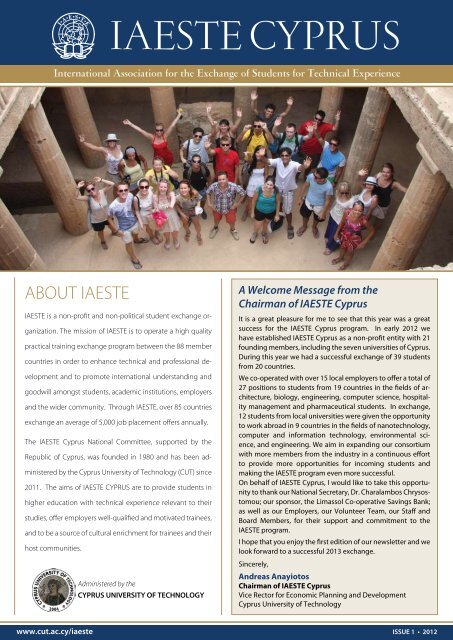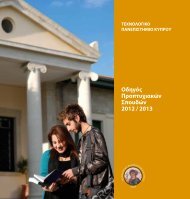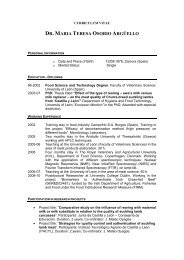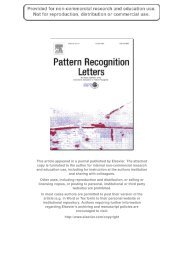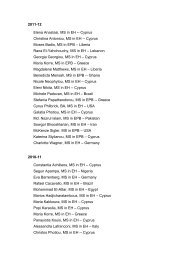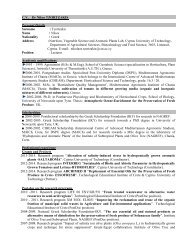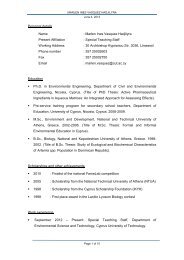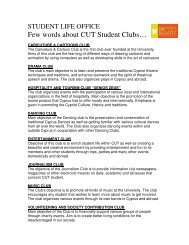IAESTE CYPRUS
IAESTE CYPRUS
IAESTE CYPRUS
You also want an ePaper? Increase the reach of your titles
YUMPU automatically turns print PDFs into web optimized ePapers that Google loves.
<strong>IAESTE</strong> <strong>CYPRUS</strong>2012 INCOMING TRAINEESStudents Exchanged to Cyprus27 Students - 19 CountriesAUSTRIAKerstin Gschwandtner / ArchitectureUniversity of Technology ViennaCyprus Land Development CorporationLaura Havinga / Environmental EngineeringUni Natural Resources & Life SciencesSewerage Board of Limassol - AmathusJohanna Ticar / Biomedical EngineeringGraz University of TechnologyYgia PolyclinicBELARUSKatsiaryna Zhurun / Tourism & HospitalityYanka Kupala State Univ of GrodnoCynthiana Beach HotelBELGIUMSoren Dhoore / Electrical EngineeringGhent UniversityCNE Technology Ltd.Arne Jules Van Damme / Info TechnologyUniversity of GhentYgia PolyclinicCROATIAJelena Kaluder / Civil EngineeringJ.J. Strossmayer in OsijekSewerage Board of NicosiaCZECH REPUBLICPavel Damborsky / Food Sci & BiotechnologyBrno University of TechnologyYgia PolyclinicSarka Mrnavkova / Civil EngineeringCzech Technical University in PragueWater Board of LimassolJakub Rozumek / Civil EngineeringCzech Technical University in PragueForest Park HotelGREECENikolaos Argyris / Electrical EngineeringNational Technical University of AthensPrimeTel PLCNikolaos Lantzounis / Civil EngineeringNational Technical University of AthensAyios Athanasios MunicipalityINDIAAbhinav Karanwal / Hotel ManagementManipal UniversityCynthiana Beach HotelAn interview with <strong>IAESTE</strong>trainee Mauro Maggi,<strong>IAESTE</strong> SwitzerlandTrainee at Limassol Co-operative Savings Bank<strong>IAESTE</strong> trainee, Mauro Maggi, participatedin the <strong>IAESTE</strong> program from <strong>IAESTE</strong> Switzerland.Mauro is a May 2012 businessgraduate of the University of Zurich.Where did the <strong>IAESTE</strong> program take you?For twelve weeks this summer, I trained at the Limassol Co-operative Savings Bank, one ofthe main sponsors of the <strong>IAESTE</strong> Cyprus program. The bank was founded in 1946 by 27 merchantsas a non-profit organization with a strong social spirit. It soon grew to become thelargest co-operative bank in Cyprus, with 26 branches. The co-op is a bank for the people,and despite the time passage I was amazed that the bank still operates with the spirit of thefounders.My duties included reviewing the Annual Report, filing, assisting the cashiers with reconciliations,and filing. I also shadowed employees in each department which helped me becomefamiliar with the main banking operations. Being in Cyprus while the “Troika” (European Commission,the International Monetary Fund, and the European Central Bank) conducted a thoroughreview of the economy of Cyprus was an invaluable experience that provided me witha great deal of insight to the banking industry.What was your most memorable experience of <strong>IAESTE</strong>?The relationships I developed during my training period. I was one of the last <strong>IAESTE</strong> arrivalsand received a very warm welcome from the <strong>IAESTE</strong> trainees and volunteers, whom I hungout with every night. Over the course of the summer we became quite close. My colleaguesat the Limassol Co-operative Bank were also very hospitable – during work and after workhours - and went out of their way to include me in their lives, making me feel like a familymember. I had never experienced anything close to the Cypriot hospitality before, whichis deeply imbedded in the culture, so it was a very positive experience and one that reallyopened my mind. As a matter of fact, I am already planning a return visit.How did you adjust to working and living abroad?At first, I experienced a culture shock – to a new environment, language, temperature, andwork hours, but I adapted quite easily. The banking environment was also new to me and offeredme a great opportunity to learn a lot. My colleagues were very competent and helpedme adapt. My expectations were totally fulfilled.It was quite amazing that the beach was so close to home - within a five minute walk from myapartment I was relaxing at the beach with friends, playing volleyball and swimming. I alsoISRAELDoron Gat / Civil EngineeringTechnion - Israeli Institute of TechSewerage Board of NicosiaLEBANONSari Kassouf / ArchitectureAmerican University of BeirutCyprus Land Development Corporation
<strong>IAESTE</strong> <strong>CYPRUS</strong>2012 INCOMING TRAINEESStudents Exchanged to Cyprus27 Students - 19 Countriesenjoyed the rooftop of my apartment building, which had a great view of Limassol, especiallyat night, when the city was lit up.What did you learn about Cyprus?I learned a great deal about the history and culture of Cyprus and the struggles the countryfaced over the years, including the occupation and the current economic crisis. I found thehistory and culture of Cyprus to be quite fascinating. In the process I also learned about theway of life in Cyprus, which is quite different from Switzerland and which I really grew to appreciate.What are your future plans?When I return to Switzerland I will complete my military service followed by a few months oftravel. I will also apply for consulting jobs and I am confident that my <strong>IAESTE</strong> Cyprus experiencewill serve as an asset. I also plan to revisit Cyprus, a place in the world where I feel that Iwill always have a home.CALENDAR OF EVENTSPOLANDAnna Gawal / Risk Management & FinanceWarsaw University of TechnologyForest Park HotelAnna Kopacz / ManagementRzeszow University of TechnologyForest Park HotelPORTUGALVicente Canhoto / Info System MgmtISCT-IUL Lisbon University InstituteA. Th. Loizou & Sons Ltd.RUSSIAAnastasia Gorozhankina / TourismBelgorod State UniversityCynthiana Beach HotelEkaterina Karaseva / TourismState Gzhel Art & Industry UniversityCynthiana Beach HotelSLOVAKIAMartina Petranikova / MetallurgyTechnical University of KosiceHellenic Copper MinesSLOVENIASpela Boh / PharmacyUniversity of LjubljanaRemedicaWelcome Party - July 19, 2012The event began with a welcome address and anintroductory video presentation followed by studentpresentations. The evening continued withtraditional Cypriot dances, a reception and music.Cultural Tour I – July 22, 2012The first cultural tour included the archeologicalsites of Kourion, Petra tou Romiou, Medieval Castle& Archaeological sites of Paphos, Tombs of theKings, and Aphrodite’s Birthplace.SPAINDavid Valero Morales / Environmental ScienceMalaga UniversitySewerage Board Limassol - AmathusSWITZERLANDMauro Maggi / BusinessUniversity of ZurichLimassol Co-operative Savings BankCultural Tour II – August 5, 2012The second cultural tour included Troodos Square,Kykkos Monastery, the UNESCO site of Saint Nicholastis Stegis, and the village of Kakopetria.<strong>IAESTE</strong> Day – October 19, 2012The <strong>IAESTE</strong> Day event kicked off a series of <strong>IAESTE</strong>Info days to be held at the seven participating academicinstitutions of the <strong>IAESTE</strong> Cyprus program.UAEMohamad Khalil / Civil EngineeringUniversity of SharjahNicosia MunicipalityUKAdam Henwood / ChemistryDurham UniversityMedochemieUKRAINENadiia Kutsii / ManagementIvano-Frankivsk National Technical UniversityForest Park Hotel
<strong>IAESTE</strong> <strong>CYPRUS</strong>2012 OUTGOING TRAINEESStudents Exchanged from Cyprus12 Students - 9 CountriesCROATIAEhsan AbdiElectrical EngineeringUniversity of NicosiaProjektni biro Split d.o.o.GREECEFotini IoannouCivil & Environmental EngineeringUniversity of CyprusNTUA - Hydrology and Water ResourcesISRAELEvanthia KaimakliotiLife Sciences/BiologyUniversity of NicosiaTel Aviv UniversityLEBANONIqbal AhsanCivil EngineeringFrederick UniversityAmerican University of BeirutPOLANDPanagiotis ApostoliMechanical EngineeringCyprus University of TechnologyInstytutu PojazdowSotiris PavlidisCivil EngineeringUniversity of CyprusBESTA PrzedsiębiorstwoOlga VoznyukComputer ScienceEuropean UniversityNeotericMuch has been made of the need for students to gain relevantwork experience before they graduate. <strong>IAESTE</strong> notonly provides internship experience but also the invaluableexperience of working abroad.Work experience gained abroad enhances your independence and flexibility,communication and foreign language skills, and contributes to your personalgrowth and academic development.<strong>IAESTE</strong> disciplines include science, engineering, technology and applied artsfor undergraduate students in the second year of study and above. The majorityof these placements are for 6 to 12 weeks in the summer months, althoughlonger periods are occasionally available.Are you interested in training abroad over the summer of 2013 through<strong>IAESTE</strong> in your field of study?Please visit www.cut.ac.cy/iaeste for more information.2012 OUTGOING EXCHANGEThis summer 12 students from universities in Cyprus trained in 9 countries: Croatia,Greece, Israel, Lebanon, Poland, Portugal, Russia, United Kingdom and the UnitedStates of America. The students trained in the fields of environmental science, computerscience, engineering and technology, chemical engineering and biology.PORTUGALVasiliki KonstantinouEnvironmental ScienceCyprus University of TechnologyCEER-Biosystems EngineeringRUSSIAHarry GeorgiouCivil EngineeringCyprus University of TechnologyMoscow State Technical University MAMISpyridon KavvadiasComputer ScienceOpen UniversityMSCUKNiki KonnariChemical EngineeringEuropean UniversityStrathclyde UniversityUSAIoannis PapazoglouEngineering & TechnologyCyprus University of TechnologyUniversity of Michigan“This summer was the best experience of my life.Working and living abroad broadened my horizons andI really benefited from the hands-on work experience.”– P. ApostoliPanagiotis Apostoli, a mechanical engineering student of the Cyprus University of Technologyspent the summer at Instytutu Pojazdow in Poland where he worked on the analysisof dynamic properties of servomechanisms in hydrostatic gear box steering systemsused in hybrid drives.
How to Apply forthe 2013 SummerExchange...T I M E L I N ENovember 30, 2012Applications are due including curriculumvitae, transcripts and three academic references.Please note that late applications may beaccepted until nominations are fulfilled,although priority will be given to qualifiedapplicants who applied by the first deadline.February 2013List of available jobs emailed to applicants.March 2013Nominations by <strong>IAESTE</strong> Cyprus based onapplication, curriculum vitae and academicreferences. If nominated, a fee of 100 Eurois due.May 2013If employer abroad accepts your nominationyou must arrange your travel and insurance.Assistance will be provided to securea visa if necessary and housing will bearranged by the receiving country <strong>IAESTE</strong>office.June 2013The start of a memorable summer abroad.Visit our website atwww.cut.ac.cy/iaesteor contact the <strong>IAESTE</strong> representativeof your university.FREQUENTLY ASKED QUESTIONS?How do I apply?You must apply through the <strong>IAESTE</strong> Cyprus website atwww.cut.ac.cy/iaeste . You will only be able to apply forspecific traineeships that <strong>IAESTE</strong> Cyprus has available.Generally, you will not be able to specify your preferreddestination or Employer.Am I Eligible?To qualify for an <strong>IAESTE</strong> placement you must be over theage of 19 and a registered science, engineering, technologyor applied arts undergraduate student in the second year ofstudy or above. Applications are accepted from students intheir final year of study but not from recent graduates.What is the length of training?Generally, trainings last between 6 to 12 weeks, with the majorityof placements taking place between June to September.Where can I go?Generally you can go to any country where <strong>IAESTE</strong> is represented.Please note that you will only be able to apply forspecific traineeships that <strong>IAESTE</strong> Cyprus has available and willgenerally not be able to specify your preferred destination orEmployer.What will I be paid?<strong>IAESTE</strong> trainees generally receive a cost of living allowancethat will at least cover food, accommodation and travel toand from work. The exact amount is determined by the costof living in the country and the Employer.What are the costs?If you are nominated for a post, a fee of 100 Euro will be due.In addition, you will have to pay for your own travel costs to/from your receiving country and for personal insurance forthe duration of the traineeship.What support will I receive if I amsuccessful in gaining a traineeship?<strong>IAESTE</strong> handles all the communications with the Employerthrough liaison with the receiving <strong>IAESTE</strong> country. The receiving<strong>IAESTE</strong> country will issue the necessary documentsfor you to obtain a work permit or visa if either is required.They will also arrange accommodation and in most cases, areception program.
Make a difference, Volunteer”Although most students are very excited about the opportunities the <strong>IAESTE</strong> program provides, moving abroad is a“The smallest act of kindnessis worth more than the grandest intention- Oscar Wildehuge transition. While adjusting to a new culture can be exhilarating, rewarding, and intellectually stimulating, it canbecome quite stressful and at times, frustrating. Fortunately, our <strong>IAESTE</strong> Cyprus Volunteer Team is well equipped tohandle such cases by offering what the Cypriots are well known for - legendary Cypriot hospitality coupled with friendshipsthat can last a lifetime.The <strong>IAESTE</strong> Cyprus Volunteer Team is comprised of a groupof dedicated individuals who help the incoming traineesadjust to a new country in an effort to improve cross culturalunderstanding.Volunteers of <strong>IAESTE</strong>:• greet incoming students• help trainees adjust to living and working abroad• help trainees understand the language, tradition, and cultureof Cyprus• participate in <strong>IAESTE</strong> events and excursions, and communityfunctions• organize and participate in volunteer events and excursionsBenefits of volunteering include:• improving cross-cultural understanding – a must in today’sglobal marketplace• enhancing management, organization and leadership skills• having networking opportunities with <strong>IAESTE</strong> alumni andfriends from around the world• filling the summer with exciting international events• accessing a network of technical students and professionals,your future colleagues• making new friendsWe are always searching for new volunteers to join our team.These are positions that require commitment and vision. In return,you have the satisfaction of knowing that your contributionmakes a significant difference.If you are interested in becoming a volunteer for <strong>IAESTE</strong> Cyprus please send us an email at iaeste@cut.ac.cy.A Heartfelt Thank You, to our Board Members,Employers and VolunteersThank you to our Board Members who established<strong>IAESTE</strong> Cyprus as a non-profit entityin 2012. The Board is comprised of 21members and includes the 7 universities,semi-governmental and governmentalorganizations, private companies, unionsand honorary members.Thank you to the Employers who openedtheir doors to the program and hostedthe incoming trainees while providingthe opportunity for local students to trainabroad.Thank you to our Volunteer Team for theirdedication and commitment, and whodemonstrated what the legendary Cypriothospitality is all about.Board MembersApollonia HotelCyprus University of TechnologyETEKEuropean UniversityFrederick UniversityFriends of TEPAKHellenic Copper Mines LtdLimassol Chamber of Commerce & IndustryLimassol Co-operative Savings BankLimassol Water BoardMedochemieNeapolis UniversityOpen UniversityPancyprian Federation of Student UnionsRemedica LtdSewerage Board of LimassolUniversity of CyprusUniversity of NicosiaHonorary Members2012 EmployersATh. Loizou & Sons LtdAyios Athanasios MunicipalityCNE Technology LtdCynthiana Beach HotelCyprus Land Development CorporationForest Park HotelHellenic Copper MinesLimassol Co-operative Savings BankMedochemieNicosia MunicipalityPrimeTel PLCRemedicaSewerage Board Limassol – AmathusSewerage Board of NicosiaWater Board of LimassolYgia Polyclinic
The mine at Skouriotissa is the world’soldest operating copper mine.An interview with <strong>IAESTE</strong> Alumni, Employer andBoard Member Mr Constandinos Xydas, CEOof the Hellenic Copper Mines Ltd.<strong>IAESTE</strong> Alumni, Mr. Constantinos Xydas, participated in the <strong>IAESTE</strong> program in 1973. He iscurrently the Chief Executive Officer of the Hellenic Copper Mines, which owns the ancientcopper mine of Skouriotissa. The mine at Skouriotissa is as rich in history as its minerals andhas been linked to Caesar, Herod and Homer. Using hydrometallurgy, the Hellenic CopperMines achieved a production milestone this year by producing its 50,000th ton of copper.“Skouriotissa is the oldest operating copper minein the world. The ancient copper slag has provento be much larger than 2 million tons and is mentionedby a number of historians since the timesof Homer. Some people believe that this mine is areal monument to man’s evolution of technologyin copper production. From the slag we see howprimitive mining was in the Bronze Age and how itdeveloped into a very sophisticated process. Whatwe know today after 4,000 years of operation isthat by using the latest technology in copper withthe lowest grade of copper ore, we have managedto produce the highest quality of copper.”– Mr. Constantinos XydasWhen did you participate in the <strong>IAESTE</strong> programand where did the program take you?I participated in the <strong>IAESTE</strong> program throughGreece in 1973, which was actually prior to theexistence of <strong>IAESTE</strong> Cyprus. At that time, I wasa third year student at the National TechnicalUniversity of Athens, School of Mining Engineeringand Metallurgy. I had learned about <strong>IAESTE</strong>through friends, and felt that it was a very goodopportunity to work abroad so I applied and wasnominated for a position at British Gypsum in theUK. For seven weeks I worked in an undergroundgypsum mine near the village of Tutbury.What are the benefits of the <strong>IAESTE</strong> program?I have many good memories of my <strong>IAESTE</strong> experienceand periodically evaluate what I gainedfrom it. Each time I reflect on it I realize that whatI gained was much greater than what I had previouslythought, which is why I am so supportive of<strong>IAESTE</strong> as an employer and as a Board Member.First of all, it was my first visit to a country whichwas different from my home country of Cyprusand from Greece, where I studied. At that time,tourism was not at the level it is today, especiallyfor countries with low incomes per capita, andvisiting foreign countries was not as easy as it istoday. The UK was completely new to me and thefirst lesson I learned was how to survive and findmy way and live independently abroad, at a veryyoung age. Secondly, I was hosted by an Englishfamily and I learned what the English way of livingwas about, which was completely different thanhow I lived – it was a new lifestyle – from the food,to the language, to how the British spent their leisuretime. Living with the family and in the villagemade quite an impression on me and my Englishlanguage skills improved remarkably over thecourse of the seven weeks.What was your most memorable experienceof <strong>IAESTE</strong>?The relationships I developed. I worked withthree fellow <strong>IAESTE</strong> students from Sweden, Ghana,and a Chinese student who lived in Malaysia.When we walked around the village the four ofus were often referred to as the United Nations.It was interesting because not only did I learnabout the UK but I also learned about the lives,countries, and program studies of my fellow traineesand we exchanged mining experiences fromour respective countries. Although we stayed intouch during the first decade we lost touch overthe years. Hopefully, the <strong>IAESTE</strong> Alumni networkwill help us rekindle our friendship as it would begreat to welcome them to Skouriotissa.How did your <strong>IAESTE</strong> experience prepareyou for your career?The most important part of my <strong>IAESTE</strong> experiencewas the work experience. Having hands-on experiencehelped me learn about things that I couldnot have learned from a textbook or in a classroom– it was something I had to live through tounderstand.I was given full responsibilities as a miner andplant operator of a gypsum mine. Knowing that Iearned the trust and confidence of my superiorsto manage the plant gave me a great deal of satisfaction.Over time, I was given more responsibility;for instance, I was responsible for the safetyand iso-contouring of the noise levels of the plantand mine and took satisfaction in knowing howpleased the manager was with my work. I learnedhow subordinates understand the work, the process,the management and their attitude and whataspects of work are more sensitive – all of whichhelped me as I climbed the career hierarchy. Ialso learned about efficiency of mineral miningand processing jobs, which is also something oneshould experience firsthand to understand and itproved to be an invaluable lesson.Any words of wisdom for our students andemployers?To our young students - speaking not only as analumnus, but as a CEO with a bird’s-eye view, Iwould encourage you to exploit the opportunitiesthat <strong>IAESTE</strong> offers.To our employers – having foreign students inthe workforce will benefit your company, youremployees and our community. The overall existenceof a foreign student in the workplaceprompts you to think deeper and with a differentperspective. You also become part of the <strong>IAESTE</strong>community, which is like a brotherhood and isquite similar to how the mining world operates.I haven’t been to a mine in the world where theydidn’t open the door and share ideas. In this respect,when you receive such hospitality you wantto return it. <strong>IAESTE</strong> presents this opportunity – togive back to the community. For every positionyou offer to <strong>IAESTE</strong>, a local student is given thechance to go abroad with <strong>IAESTE</strong> to broaden theirhorizons – this is the spirit of <strong>IAESTE</strong>.
CONTACT INFORMATION<strong>IAESTE</strong> Cyprus National OfficeAdministered by theCyprus University of TechnologyP.O. Box 503293603 Limassol, CyprusPhone: +357-25-002392Email: cyprus@iaeste.orgNational SecretaryDr. Charalambos ChrysostomouOfficersDemetra Valtas & Dia Evagorou<strong>IAESTE</strong> <strong>CYPRUS</strong>is administered by the<strong>CYPRUS</strong> UNIVERSITY OFTECHNOLOGYUniversity RepresentativesCyprus University of TechnologyDemetra ValtasPhone: +357-25-002392Email: iaeste@cut.ac.cyEuropean UniversityMaria GallouPhone: +357-22-713069Email: m.gallou@euc.ac.cyFrederick UniversityAthena SkotaraPhone +357-22-431355 ext.123Email: ad.as@frederick.ac.cyThe <strong>IAESTE</strong> <strong>CYPRUS</strong> Boardthanks theLimassol Co-operativeSavings Bankfor their sponsorshipand unwavering supportNeapolis UniversityDr. Julia GeorgiPhone: +357-26-843300Email: j.georgi@nup.ac.cyOpen UniversityElena GregoriouPhone: +357-22-411600Email: gregoriou@ouc.ac.cyUniversity of CyprusDr. Gregory MakridesPhone: +357-22-894287Email: makrides.g@ucy.ac.cyUniversity of NicosiaDr. George K. GregoriouPhone: +357-22-841650E-mail: gregoriou.g@unic.ac.cywww.stl.com.cywww.cut.ac.cy/iaeste ISSUE 1 • 2012


